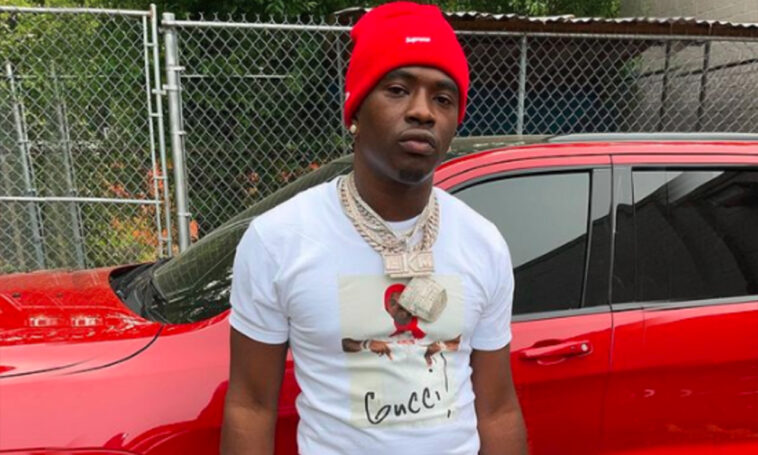Bankroll Freddie, the Arkansas rapper known for hits like “Rich Off Grass” and “Add It Up,” has been sentenced to 12.5 years in federal prison. This sentence follows his conviction for serious drug and weapons charges. Freddie, whose real name is Freddie Demarus Gladney III, was found guilty of marijuana possession and distribution, firearm possession related to drug trafficking, and using a communications facility for drug-related crimes. His arrest was part of a larger federal operation targeting gang activity in Arkansas. This case sheds light on the ongoing issues of gang violence and drug trafficking in the music industry.
Bankroll Freddie, a rising star in the hip-hop scene, has been sentenced to 12.5 years in federal prison. The rapper, known for his catchy tracks like “Rich Off Grass” and “Add It Up,” received his sentence after being found guilty on multiple drug and weapons charges. His real name is Freddie Demarus Gladney III.
The conviction stems from a large-scale investigation into gang activity in Arkansas.
“In April, Freddie was found guilty of several serious offenses. These include possession and distribution of marijuana, possession and distribution of a controlled substance, and firearm possession in furtherance of drug trafficking.”
Additionally, he was charged with using a communications facility to facilitate drug trafficking crimes.
Freddie’s legal troubles began in 2022 when he was arrested as part of a federal sweep targeting gangs in Arkansas, specifically the Every Body Killas (EBK) and the Loady Murder Mobb. Reports indicate that Freddie was allegedly a member of the EBK gang, which saw over 30 arrests during the operation. Notably, his father, Freddie Gladney Jr., was also taken into custody in connection with the same investigation.
According to court documents, Freddie and other gang members were accused of conspiring to distribute cocaine, crack cocaine, methamphetamine, and marijuana. The drug trafficking operation reportedly funded their daily activities and lifestyle. This case highlights the dangerous intersection of music, fame, and gang violence, which continues to plague the hip-hop community.
Bankroll Freddie signed with Quality Control Music in 2019, a label known for managing several successful artists. His debut album, “From Trap to Rap,” was released in 2020 and featured collaborations with popular artists like Moneybagg Yo, Young Dolph, and Lil Baby. One of his most notable singles, “Pop It,” was released in 2021 and included a feature from Megan Thee Stallion. Despite his rising fame, Freddie’s legal issues overshadowed his music career.
Freddie’s conviction and subsequent sentencing serve as a cautionary tale for young artists in the music industry. The pressures of success, combined with the lure of gang culture, can lead to devastating consequences. Many artists grapple with their pasts as they seek to build a future in the competitive world of hip-hop.
The sentencing has drawn attention to the ongoing issues of drug trafficking and gang violence within the music community. Freddie’s case is not isolated; it reflects a broader trend where artists find themselves entangled in illegal activities, often leading to serious legal repercussions.
In the wake of his sentencing, it is essential to consider the impact of these issues on the hip-hop industry. Many artists use their music as a means to escape their pasts, yet they often find themselves drawn back into the very circumstances they sought to leave behind. Freddie’s story is a reminder of the fine line between fame and the pitfalls that can accompany it.
In a statement following his conviction, Freddie acknowledged the mistakes he made but expressed hope for the future. “I plan to use this time to reflect and grow,” he stated. This sentiment echoes the thoughts of many artists who face legal challenges; the hope that they can turn their lives around and continue to inspire others through their music.
As Bankroll Freddie begins his prison sentence, the music world will watch closely. His case raises important questions about accountability, the influence of gang culture in hip-hop, and the responsibility of artists to their communities. While his music career may be on pause, the lessons learned from this experience could resonate deeply within the industry.
Bankroll Freddie’s sentencing serves as a significant reminder of the challenges faced by artists in the hip-hop community. With his 12.5-year prison term, the rapper’s journey highlights the urgent need for dialogue around the consequences of gang affiliation and drug trafficking in music. As Freddie navigates this difficult chapter, the hope remains that he will emerge ready to share his story and inspire change in the industry.





Join the Community and Be a Part of the Conversation
You must be logged in or registered to post a comment.